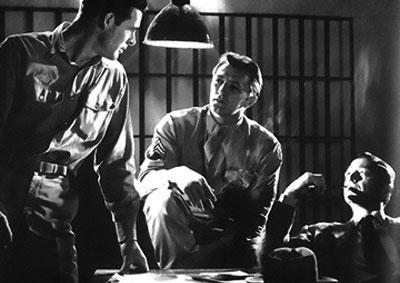 Crossfire
Ginny: I don't like cops.
Finlay: Nobody likes cops.
Crossfire
Ginny: I don't like cops.
Finlay: Nobody likes cops.
While the hate motive has been changed from the book, from a homosexual to Jewish man, you can still see the original scenario should you find yourself looking for it. And for me, it belongs to this story far more, as it plays out. The characters, their actions and how they interact with one another. It is more cohesive. Without it, I see the incorrect fitting of a "replacement" hatred that causes me to pause and wonder what exactly is going on and why it doesn't seem to fit together.
But that is a minor critique and easily rectified by a simple mindset of what it should be as opposed to what the Studio/Hays Code insisted upon.
Making for, what this truly is, a d@mn good story that delves into what people felt and think as opposed to a basic mystery whodunit. Bringing an added depth to -- well, everyone. Many of which are world weary of the hardships they've endured; creating, not so much a callousness, but a preference to be left out of more hardship. The hatred that led to the murder, shaking loose the tired, indifferent fog of those involved in the investigation. Reviving and giving people purpose. You see it most in Robert Young's Finlay. His indifference to yet another senseless death becomes a determined focus as he sets his sights on who is guilty and ensuring they have him dead to rights.
I would also like to comment on Robert Ryan and my new, improved outlook on him as an actor. From what I've read, this role set him up to play similar personas in his career and, for me, he really put a lot into this role and the "masks" that fall to the wayside as they close in on him. He was incredible in this and while I've appreciated other works of his, like
The Wild Bunch, this film as kicked it up a few notches.







